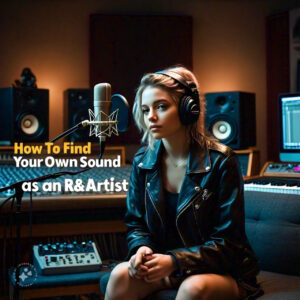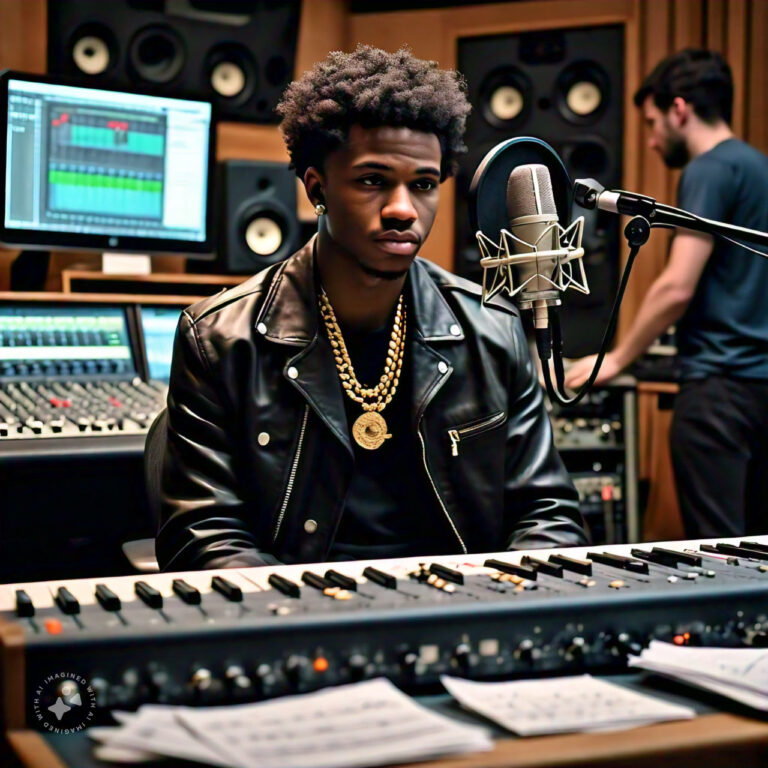Are you an R&B Artist? I have Goodnews for you, Today we are going to give you Step by Step on How To Find Your Own Sound as an R&B Artist just read this article to the end.
Hey there, fellow songwriters and R&B enthusiasts!, as a singer-songwriter who’s spent years navigating the vibrant and ever-evolving world of R&B, I know firsthand the exhilarating yet often challenging journey of discovering your unique sound. It’s that special something that sets you apart from the crowd, that resonates with listeners on a deep level, and that ultimately defines your artistry.
But what exactly is “your own sound”? It’s like a musical fingerprint, a blend of influences, experiences, and creative choices that coalesce into a sonic identity that’s unmistakably yours. It’s the magic that happens when you tap into your authentic self and channel it through your music.
So, how do you find your own sound as an R&B artist? While there’s no one-size-fits-all answer, I’ve distilled my insights and experiences into 10 key tips that will guide you on this exciting quest. Whether you’re just starting or a seasoned pro, these tips will help you unlock your full creative potential and carve out your niche in the R&B landscape.
Why Does It Matters To Find Your Sound?
In the vast ocean of R&B music, finding your own sound is like discovering a hidden treasure. It’s what allows you to break through the noise and capture the attention of listeners who crave something fresh and authentic.

Think of your favorite R&B artists – the ones whose music you can recognize instantly. They’ve all cultivated a signature sound that sets them apart.
- Beyoncé: Her powerful vocals, blend of pop, soul, and hip-hop influences, and empowering lyrics create an unmistakable sound.
- Frank Ocean: His introspective lyrics, experimental production, and genre-bending style have made him a pioneer in modern R&B.
- H.E.R.: Her soulful voice, vulnerable songwriting, and live instrumentation create a timeless R&B sound with a modern edge.
These artists, and countless others, have found their own sound by embracing their individuality, experimenting with different styles, and staying true to their artistic vision.
A unique sound is essential for:
- Standing Out: In a crowded market, a distinct sound helps you cut through the clutter and leave a lasting impression.
- Connecting with Audiences: People gravitate towards music that resonates with them on a personal level. Your unique sound can create a deeper connection with your fans.
- Building a Lasting Career: Artists with a defined sound are more likely to cultivate a loyal following and build a sustainable career.
Top 10 Tips To Find Your Own Sound as an R&B Artist
Ready to dive in? Let’s get started!
Tips 1: Discover Your Musical Roots
- Check out the Rock and Roll Hall of Fame to learn about the history of R&B and its pioneers.
- Listen to playlists on music streaming platforms like Spotify and Apple Music to discover new artists and genres.
Tips 2: Experiment Without Fear: Stepping Outside Your Comfort Zone
To find your own sound, you need to be willing to experiment and step outside your comfort zone. Don’t be afraid to try new things, even if they seem unconventional or risky.
Some ideas for experimentation:
- Play with different chord progressions: Explore major, minor, diminished, and augmented chords.
- Experiment with unusual rhythms: Incorporate syncopation, polyrhythms, or odd time signatures.
- Try different vocal techniques: Experiment with vibrato, falsetto, runs, and ad-libs.
- Use unconventional instruments: Incorporate sounds from everyday objects or create your own instruments.
- Collaborate with artists from other genres: Blend R&B with elements of electronic music, rock, or even classical music.
Remember, there are no rules in music. The only limit is your imagination. So, let your creativity run wild and see where it takes you.
Pro Tip: Don’t be afraid to fail. Some of the most innovative and groundbreaking music has come from artists who were willing to take risks and embrace the unknown.
Tips 3: Develop Your Unique Vocal Style
- Warm up your voice with exercises like lip trills and scales. (Source: Voice Lessons To Go)
- Study the vocal techniques of your favorite R&B artists. Analyze their breath control, dynamics, and expression.
Production is a powerful tool for shaping your sound. The choices you make in terms of instrumentation, arrangement, mixing, and mastering can dramatically impact the overall feel of your music.
Some things to consider when crafting your sonic landscape:
- Instrumentation: What instruments do you want to use? Are you drawn to live instrumentation, electronic sounds, or a combination of both?
- Arrangement: How do you want to arrange the different elements of your music? What kind of dynamics and textures do you want to create?
- Mixing: How do you want to balance the different tracks in your song? Do you want a clean and polished sound, or something more raw and gritty?
- Mastering: What kind of final polish do you want to give your music? Do you want to boost the overall loudness, or focus on preserving the dynamics?
There are endless possibilities when it comes to production. The key is to experiment and find what works best for your music.
Pro Tip: If you’re not a producer yourself, consider collaborating with one who shares your artistic vision. A good producer can help you take your music to the next level.
Tips 4: Find Your Voice: Lyrical Content and Delivery
Your voice is more than just the sound that comes out of your mouth. It’s your unique perspective, your life experiences, and your emotions. It’s what makes your music relatable and authentic.
To find your voice as a songwriter, you need to dig deep and explore your inner world. What are you passionate about? What are your hopes, fears, and dreams? What stories do you have to tell?
Once you’ve identified your core message, you can start crafting lyrics that express your thoughts and feelings in a way that resonates with others.
Some tips for writing impactful lyrics:
- Be honest and vulnerable: Share your personal experiences and emotions.
- Use vivid imagery and metaphors: Paint a picture with your words.
- Write in a conversational style: Use language that feels natural and authentic.
- Tell stories: Capture the essence of your experiences through narrative.
- Focus on themes that resonate with your audience: Love, loss, identity, social justice, etc.
Your vocal delivery is equally important. It’s the bridge between your lyrics and your audience. It’s how you convey the emotion and meaning behind your words.
Some tips for improving your vocal delivery:
- Practice regularly: The more you sing, the stronger and more expressive your voice will become.
- Warm up before you sing: This will help prevent vocal strain and improve your range.
- Focus on breath control: Good breath support is essential for singing with power and clarity.
- Pay attention to your posture: Good posture will help you project your voice and sing with ease.
- Experiment with different vocal styles: Try singing in different registers, using vibrato, and adding embellishments.
Pro Tip: Record yourself singing and listen back critically. This will help you identify areas where you can improve.
Tips 5: Collaborate with Diverse Artists: Expanding Your Creative Horizons
Collaboration is a powerful catalyst for creativity. When you work with other artists, you’re exposed to new ideas, perspectives, and techniques. This can help you break out of your creative rut and discover new aspects of your own sound.
Some benefits of collaborating with other artists:
- Learn from each other: Share knowledge, skills, and experiences.
- Gain new perspectives: See your music through fresh eyes.
- Expand your network: Connect with other musicians and industry professionals.
- Create something unique: Blend your styles to create something new and unexpected.
Don’t be afraid to collaborate with artists from different genres. The most exciting collaborations often happen when musicians from diverse backgrounds come together to create something truly original.
Pro Tip: Look for collaborators who challenge you and push you outside your comfort zone. This is where the real magic happens.
Tips 6: Experiment with Songwriting Techniques
- Read books on songwriting like “The Songwriting Sourcebook” by Rikky Rooksby.
- Collaborate with other songwriters to learn from their approaches and techniques.
Tips 7: Refine Your Sound Through Live Performance
Live performance is a crucial part of the creative process for any musician. It’s where you get to connect with your audience on a deeper level, test new material, and refine your sound.
When you perform live, you’ll get immediate feedback from your audience. Pay attention to how they react to your music. Do they dance? Do they sing along? Do they seem engaged? This feedback can help you gauge whether your music is resonating with others and identify areas where you can make adjustments.
Pro Tip: Don’t be afraid to experiment with your live performances. Try different arrangements, set lists, and stage setups. See what works best for you and your audience.
Tip 8: Draw Inspiration from Other Genres
- Listen to music from different genres to find inspiration. (Source: Genre-Specific Playlists on Spotify)
- Experiment with different instruments and production techniques to create a fusion sound.
9. Embrace Feedback (But Stay True to Yourself): The Art of Balancing Input
Feedback is an invaluable tool for growth and development as an artist. It can help you identify your strengths and weaknesses, and make informed decisions about your music.
But it’s important to remember that not all feedback is created equal. Some feedback will be constructive and helpful, while other feedback may be misguided or even hurtful.
It’s your job to filter through the feedback you receive and determine what’s worth incorporating into your work. Trust your instincts and don’t be afraid to say no to suggestions that don’t align with your artistic vision.
Some tips for seeking feedback:
- Choose your sources wisely: Ask for feedback from people you trust and respect. This could include fellow musicians, producers, mentors, or even family and friends.
- Be specific in your questions: Don’t just ask, “What do you think of my music?” Instead, ask specific questions about your lyrics, your melodies, your production, or your performance.
- Be open to criticism: It’s natural to feel defensive when someone criticizes your work. But try to see it as an opportunity for growth.
- Don’t take everything personally: Remember, feedback is just one person’s opinion.
- Use feedback to improve your craft: Take the feedback you receive and use it to make your music even better.
Pro Tip: Create a feedback loop with other artists. Share your work with each other and offer constructive criticism. This can be a great way to learn and grow together.
Tips 10: Stay Inspired: Listen to New Music Regularly and Keep Learning
To stay ahead of the curve and continue evolving as an artist, it’s crucial to stay inspired and keep learning.
Make it a habit to listen to new music regularly. Explore different genres, discover emerging artists, and stay up-to-date with the latest trends.
Some resources for discovering new music:
- Streaming platforms: Spotify, Apple Music, Tidal, YouTube Music
- Music blogs and websites: Pitchfork, Complex, The FADER, Okayplayer
- Social media: Follow your favorite artists and music publications on Twitter, Instagram, and Facebook.
- Live music venues: Go to concerts and support local artists.
In addition to listening to new music, continue to hone your craft by taking lessons, attending workshops, and learning from other musicians.
The more you learn, the more tools you’ll have at your disposal to express yourself through your music.
Pro Tip: Don’t be afraid to step outside your comfort zone and explore new musical territories. You might be surprised at what you discover.
Conclusion
Finding your own sound takes time, patience, and perseverance. It’s a journey of self-discovery and creative exploration.
Don’t get discouraged if you don’t find your sound overnight. Trust the process and keep creating.
The more you write, record, and perform, the closer you’ll get to finding your unique voice.
Remember, the most important thing is to enjoy the journey. Music is a gift, so embrace it and have fun!
Related Posts:
- TikTok For Musicians: 17 Content Ideas To Grow Your Following
- Everything You Need To Know About 360 Deals in the Music Industry
- AI Tools for Songwriting: 10 Generators to Step Up Your Game
- What are Performance Royalties? Explained for Musicians
- How To Write a Good R&B Song Like a Pro Within 30 Minutes – 10 Tips


